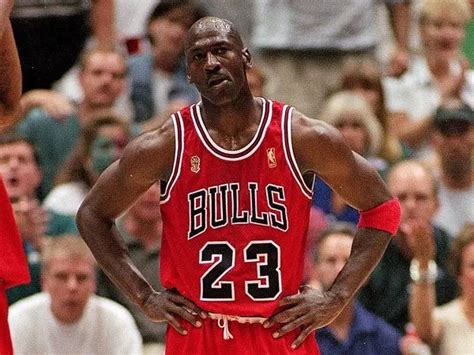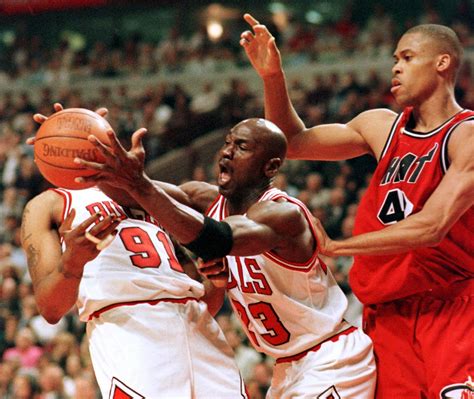
Michael Jordan, driven by an insatiable competitive spirit, revealed he’s hesitant to fully embrace his legacy, fearing complacency and a perceived endpoint to his relentless pursuit of achievement.
Michael Jordan, arguably the greatest basketball player of all time, remains intensely competitive even in retirement, a trait that paradoxically keeps him from fully embracing his monumental legacy. In a recent interview, Jordan expressed his reluctance to view his career in the rearview mirror, explaining that doing so would signal an end to his competitive drive, a prospect he finds unsettling. This refusal to rest on his laurels underscores the relentless mentality that propelled him to unprecedented heights in the NBA and continues to fuel his endeavors off the court.
“I can’t close the door totally because of the competitive nature that I have,” Jordan stated. “If I close the door, I’m walking away from the very thing that I feel like I was born to do. As long as I am healthy, I want to compete at something.” This sentiment highlights Jordan’s unwavering desire to challenge himself and remain engaged in pursuits that demand excellence.
Jordan’s competitive fire, legendary throughout his playing days, is inextricably linked to his success. He transformed the Chicago Bulls into a dynasty, winning six NBA championships, six Finals MVP awards, and five regular-season MVP awards. His relentless pursuit of perfection not only defined his individual career but also set a new standard for competitive excellence in professional sports.
For Jordan, acknowledging the totality of his accomplishments feels akin to accepting a finish line, something his competitive spirit refuses to allow. He sees his legacy not as a final chapter, but as an ongoing narrative, one that continues to be shaped by his present actions and future ambitions. This perspective offers a unique insight into the mindset of a champion who continues to seek challenges even after reaching the pinnacle of his profession.
Jordan’s current business ventures reflect his continued competitive drive. He is the principal owner of the Charlotte Hornets, a team he purchased in 2010, and has been actively involved in shaping its roster and organizational culture. While his tenure as owner has been met with mixed results, his commitment to building a successful franchise remains unwavering. He also maintains lucrative endorsement deals with Nike, Gatorade, and other major brands, further solidifying his status as a global icon. These ventures allow him to channel his competitive energy into different arenas, proving that his desire to win extends far beyond the basketball court.
Jordan’s competitive spirit also extends to the golf course, where he is known to be a formidable player. He frequently participates in celebrity golf tournaments and is intensely focused on improving his game. This passion for golf serves as another outlet for his competitive urges, allowing him to test his skills and push himself to new limits in a different domain.
The interview also touched on the evolution of the NBA since Jordan’s era. While he acknowledges the increased athleticism and skill level of modern players, he maintains that the fundamental principles of the game remain the same. He emphasized the importance of teamwork, discipline, and mental toughness, qualities that he believes are essential for success in any era.
Jordan’s reluctance to fully embrace his legacy stems from a deep-seated fear of complacency. He believes that acknowledging his past achievements would diminish his desire to continue pushing himself, to strive for new goals, and to remain engaged in the competitive arena. This perspective provides a valuable lesson for anyone seeking to achieve lasting success: that maintaining a competitive mindset is crucial for continued growth and innovation.
The ongoing debate about Jordan’s place in basketball history, particularly in comparison to contemporary stars like LeBron James, further fuels his competitive spirit. While Jordan acknowledges James’s remarkable achievements, he remains confident in his own legacy and the unique contributions he made to the game. This ongoing comparison serves as a constant reminder of the standards he set and the expectations he continues to live up to.
In conclusion, Michael Jordan’s refusal to fully embrace his legacy is not a sign of arrogance or denial, but rather a testament to his unwavering competitive spirit. It is a reflection of his deep-seated belief that complacency is the enemy of progress and that true greatness requires a constant pursuit of excellence. This mindset, which defined his playing career, continues to drive his endeavors off the court and serves as an inspiration to athletes and individuals around the world. His legacy is not a closed chapter, but an ongoing story of relentless ambition and unwavering dedication to the pursuit of greatness.
The hesitance to fully accept his legacy underscores a broader theme of continuous striving and self-improvement. Jordan’s approach provides a powerful message: individuals, regardless of their past accomplishments, should consistently seek fresh challenges and maintain a competitive outlook to unlock their full potential. This philosophy not only explains Jordan’s post-basketball choices, but also provides a valuable lesson for anyone trying to succeed in any field. He believes that by remaining hungry and engaged, he can continue to contribute and remain relevant, even outside the basketball arena.
Furthermore, Jordan’s perspective highlights the psychological complexities of achieving immense success. Many athletes and high achievers struggle to reconcile their past accomplishments with their present and future ambitions. The fear of being defined solely by their past achievements can be a powerful motivator, pushing them to seek new challenges and redefine their identities. Jordan’s reluctance to embrace his legacy is a manifestation of this struggle, a desire to remain relevant and continue making an impact.
His current ventures, such as his ownership of the Charlotte Hornets and his ongoing endorsements, are not merely about maintaining his wealth or fame. They are about staying active, engaged, and competitive. Jordan is not content to simply bask in the glory of his past achievements; he wants to continue building, creating, and achieving. This drive is what separates him from many other retired athletes who are content to fade into obscurity.
The discussion around Jordan’s legacy often involves comparisons to other all-time greats, particularly LeBron James. While such comparisons are inevitable, they also underscore the subjective nature of greatness. Each athlete has their own unique set of skills, accomplishments, and challenges. Jordan’s legacy is defined not only by his on-court achievements but also by his impact on the game of basketball and his influence on popular culture. He revolutionized the sport, inspired millions of fans around the world, and set a new standard for athletic excellence.
Moreover, Jordan’s commitment to giving back to the community is an important aspect of his legacy. Through his charitable foundation, he has supported numerous causes, including education, youth development, and healthcare. He recognizes the importance of using his platform to make a positive impact on the lives of others, and he is committed to continuing this work in the years to come.
Ultimately, Michael Jordan’s refusal to fully embrace his legacy is a testament to his enduring competitive spirit and his unwavering commitment to excellence. It is a reminder that true greatness is not about resting on one’s laurels, but about constantly pushing oneself to new heights. His story serves as an inspiration to athletes, entrepreneurs, and individuals around the world, encouraging them to embrace challenges, pursue their passions, and never stop striving for greatness. The “competitive nature” that keeps him from reflecting too much ensures he continues to shape his legacy, both on and off the court, making him more than just a basketball legend but a symbol of relentless pursuit and achievement.
The reluctance to fully accept his past also speaks to the pressure of living up to the “Michael Jordan” standard. The name itself has become synonymous with excellence, demanding continuous demonstration of high performance, whether in business, sports, or even personal endeavors. This creates a perpetual cycle of proving oneself, which Jordan seems to embrace rather than shy away from.
In a way, Jordan’s perspective is a reflection of the American Dream – the idea that anyone can achieve success through hard work and determination. He embodies this ideal, not only through his basketball career but also through his continued pursuit of new challenges. His story is a reminder that success is not a destination but a journey, and that the most important thing is to keep moving forward, regardless of past accomplishments.
Jordan’s impact extends beyond the realm of sports and business, making him a cultural icon. His influence is seen in fashion, music, and popular culture, cementing his place as one of the most recognizable and influential figures of the 20th and 21st centuries. This broader impact is a testament to his charisma, his talent, and his ability to connect with people from all walks of life.
His dedication to the game and his fierce competitive spirit are qualities that continue to resonate with fans around the world. He is a role model for aspiring athletes, demonstrating the importance of hard work, dedication, and perseverance. His legacy is not just about winning championships; it’s about inspiring others to pursue their dreams and to strive for excellence in all that they do.
As Jordan continues to navigate his post-basketball career, his competitive spirit will undoubtedly continue to drive his decisions and shape his legacy. Whether he is building a successful basketball franchise, expanding his business empire, or simply challenging himself on the golf course, he will always be driven by the desire to win and to be the best. This unwavering commitment to excellence is what defines Michael Jordan and what will continue to inspire generations to come.
In addition to his professional pursuits, Jordan’s personal life also reflects his competitive nature. He approaches fatherhood and family life with the same dedication and passion that he brought to the basketball court. He is deeply involved in the lives of his children and grandchildren, and he strives to instill in them the same values of hard work, discipline, and perseverance that have guided his own life. This commitment to family further underscores his commitment to excellence and his desire to make a positive impact on the world.
Jordan’s legacy is also shaped by the many people who have been influenced by him, both directly and indirectly. From his teammates and coaches to his fans and admirers, he has inspired countless individuals to pursue their dreams and to strive for greatness. His impact on the game of basketball is undeniable, and his influence extends far beyond the court. He is a symbol of success, determination, and the power of the human spirit.
The complexities of Jordan’s personality and motivations are often debated and analyzed by fans and experts. Some view him as a ruthless competitor, willing to do whatever it takes to win. Others see him as a charismatic leader, inspiring his teammates to achieve their full potential. Regardless of one’s perspective, it is clear that Jordan is a complex and multifaceted individual whose legacy will continue to be debated and celebrated for years to come.
His impact on the business world is equally significant. As a global brand ambassador for Nike and other major companies, he has helped to shape the landscape of sports marketing and endorsements. His Air Jordan brand is one of the most successful and recognizable athletic shoe lines in history, generating billions of dollars in revenue each year. This success is a testament to his marketability, his business acumen, and his ability to connect with consumers on a global scale.
Jordan’s ability to transcend the sport of basketball and become a cultural icon is a rare and remarkable achievement. He is not just a basketball player; he is a symbol of success, ambition, and the American Dream. His story is an inspiration to people from all walks of life, demonstrating that anything is possible with hard work, dedication, and a relentless pursuit of excellence.
His legacy is further cemented by the numerous awards and accolades he has received throughout his career. In addition to his six NBA championships and five MVP awards, he has been inducted into the Naismith Memorial Basketball Hall of Fame and named one of the 50 Greatest Players in NBA History. These honors are a testament to his unparalleled talent, his dedication to the game, and his lasting impact on the sport.
As Jordan continues to shape his post-basketball career, he remains committed to giving back to the community and using his platform to make a positive impact on the world. Through his charitable foundation, he has supported numerous causes, including education, youth development, and healthcare. He recognizes the importance of using his success to help others, and he is committed to continuing this work in the years to come.
In conclusion, Michael Jordan’s refusal to fully embrace his legacy is a reflection of his enduring competitive spirit and his unwavering commitment to excellence. It is a reminder that true greatness is not about resting on one’s laurels, but about constantly pushing oneself to new heights. His story serves as an inspiration to athletes, entrepreneurs, and individuals around the world, encouraging them to embrace challenges, pursue their passions, and never stop striving for greatness. His “competitive nature” ensures he continues to shape his legacy, both on and off the court, making him more than just a basketball legend but a symbol of relentless pursuit and achievement.
The continuous drive also highlights a common trait among high achievers: the fear of stagnation. Many successful individuals find that resting on past accomplishments can lead to a decline in motivation and a loss of purpose. Jordan’s reluctance to fully embrace his legacy can be seen as a way to combat this fear, ensuring that he remains engaged, challenged, and motivated. This proactive approach to maintaining his competitive edge is a key factor in his ongoing success.
Jordan’s approach to legacy also has implications for how future generations will perceive his career. By refusing to be defined solely by his past achievements, he ensures that his legacy remains dynamic and evolving. This allows him to continue shaping his narrative and influencing the world around him, even after his playing days are over. His legacy is not a static monument but a living, breathing entity that continues to grow and evolve.
The discussion around Jordan’s legacy also raises questions about the nature of success and achievement. Is success a destination or a journey? Is it about reaching the top or about constantly striving to improve? Jordan’s perspective suggests that it is both. He has achieved immense success, but he is not content to simply bask in the glory of his past accomplishments. He is constantly seeking new challenges and striving to improve, demonstrating that success is a continuous process rather than a final destination.
Jordan’s impact on the business world also underscores the importance of branding and marketing. His Air Jordan brand is a prime example of how a strong personal brand can translate into immense commercial success. His ability to connect with consumers on a personal level, combined with his unparalleled athletic achievements, has made him one of the most marketable athletes in history. This success serves as a blueprint for other athletes and entrepreneurs looking to build their own personal brands.
Finally, Jordan’s story is a reminder of the importance of giving back to the community. He has used his platform to support numerous charitable causes and to make a positive impact on the lives of others. This commitment to social responsibility is an integral part of his legacy, demonstrating that true success is not just about personal achievement but also about making a difference in the world. His ongoing efforts to support education, youth development, and healthcare underscore his commitment to creating a better future for generations to come.
Frequently Asked Questions (FAQ)
1. Why is Michael Jordan reluctant to fully embrace his legacy?
Michael Jordan is reluctant to fully embrace his legacy because his competitive nature prevents him from closing the door on the drive to achieve more. He fears that fully accepting his past accomplishments would lead to complacency and a diminished desire to continue pushing himself to new heights. As Jordan himself stated, “I can’t close the door totally because of the competitive nature that I have. If I close the door, I’m walking away from the very thing that I feel like I was born to do. As long as I am healthy, I want to compete at something.”
2. How does Michael Jordan’s competitive spirit manifest itself outside of basketball?
Outside of basketball, Michael Jordan’s competitive spirit manifests itself in several ways. He is the principal owner of the Charlotte Hornets, where he actively participates in shaping the team’s roster and organizational culture, striving to build a successful franchise. He maintains lucrative endorsement deals with major brands, demonstrating his continued desire to remain relevant and successful in the business world. Jordan is also known to be a passionate golfer, constantly seeking to improve his game and compete in celebrity tournaments.
3. How does Michael Jordan’s view of his legacy compare to that of other athletes?
Michael Jordan’s view of his legacy is unique in that he sees it not as a completed chapter but as an ongoing narrative. Many athletes embrace their past achievements and retire comfortably, but Jordan’s competitive spirit compels him to remain engaged in pursuits that demand excellence. He fears that acknowledging the totality of his accomplishments would diminish his desire to continue striving for new goals, setting him apart from athletes who are content to rest on their laurels.
4. What are some of the challenges Michael Jordan faces in managing his legacy?
One of the primary challenges Michael Jordan faces in managing his legacy is living up to the high standards associated with his name. The “Michael Jordan” standard has become synonymous with excellence, creating a perpetual cycle of proving himself in various endeavors, whether in business, sports, or personal life. Additionally, the ongoing comparisons to other all-time greats, such as LeBron James, further fuel his competitive spirit and create pressure to maintain his standing in basketball history.
5. What impact has Michael Jordan had on popular culture and the business world?
Michael Jordan’s impact on popular culture and the business world is profound. He revolutionized the sport of basketball, inspiring millions of fans around the world and setting a new standard for athletic excellence. His influence is seen in fashion, music, and popular culture, cementing his place as one of the most recognizable and influential figures of the 20th and 21st centuries. In the business world, his Air Jordan brand is one of the most successful athletic shoe lines in history, generating billions of dollars in revenue and demonstrating his marketability and business acumen. Furthermore, he has set new standards for sports marketing and endorsements, becoming a role model for athletes and entrepreneurs alike.









